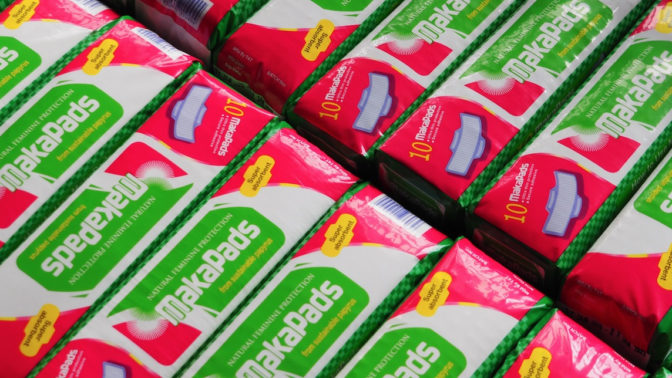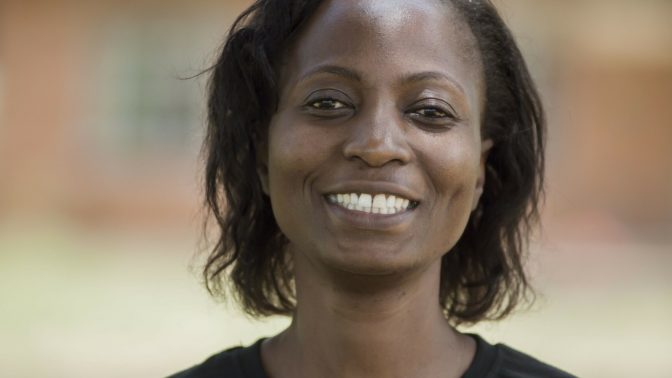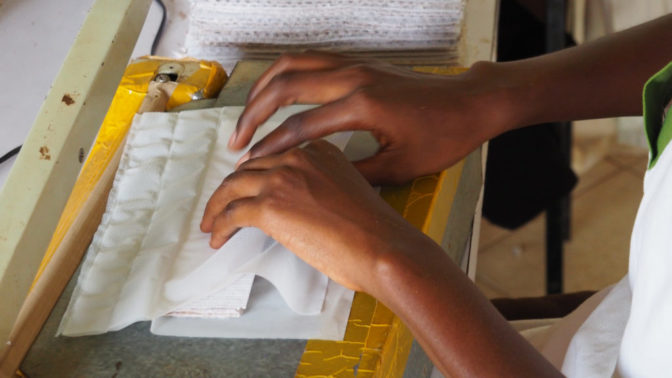Mirembe Nnassuuna turned to mentorship to scale the impact of her company’s inventions
Mirembe Nnassuuna and her mentor are taking MakaPads from an invention to a full-fledged business.
In 2013, the U.N. High Commissioner for Refugees (UNHCR) purchased over 1,000,000 MakaPads, an all-natural menstrual pad made from recycled paper and papyrus, from Technology for Tomorrow (T4T). The UNHCR was the biggest purchaser of MakaPads for a little over a decade — but that all changed in 2017.

Based in Kampala, Uganda, T4T creates practical and affordable technology made from locally sourced materials and labor that solves problems faced by those living in rural poverty. In addition to MakaPads, Technology for Tomorrow has developed water tanks for collecting rainwater, an incinerator for hazardous materials and low-cost and eco-friendly bricks made from soil. While innovation has never been a problem for T4T, the end of its relationship with the UNHCR served as a reminder that businesses aren’t built on innovation alone – there are more processes to build, implement and manage to grow a sustainable business.
Mirembe Nnassuuna is the CEO of IMPACC MakaPads Ltd., a Director at Technology for Tomorrow and member of the epMentoring program. Mirembe is currently working with her mentor to develop a plan to take MakaPads from an invention to a business. On a recent Zoom call she filled us in on the history of MakaPads, her experience working with Frank and shared advice on how entrepreneurs can get the most out of mentorship.
The epMentoring program is a joint program between enpact and the empowering people. Network (epN), an initiative of Siemens Stiftung, a non-profit foundation that promotes sustainable social development.
Trigger warning: This story contains brief, non-graphic mentions of assault and violence against women.

Please tell us a bit about yourself and MakaPads. How were they created and what problem are they solving?
MakaPads were created to address a very unfortunate reality, which is that many girls in Uganda and other areas actually drop out of school or miss school because they’re experiencing menstruation. If you miss four or five days at school and can’t catch up and fail your exam you may ask, “Well, why should I even go back?” It’s a very serious dilemma that directly impacts the future of a large percentage of the population.
Our lead engineer and founder, Dr. Musaazi, was tasked by the Rockefeller Foundation in 2004 with finding a solution to this problem. Women were already using sanitary materials, but not all of them had access to high-quality or safe pads. The sanitary pad had to be made with readily available materials, be able to be created by someone without extensive schooling or training and be biodegradable. After a long R&D process, Dr. Musaazi settled on papyrus. We have a lot of swamps in Uganda, which are filled with papyrus that sits in water for years and does not leak. If it can hold water for years, then it should be able to hold blood.
MakaPads is such a unique name. What’s the story behind it?
“Maka” in my language, and to most people in Uganda, means “home.” As women grow, their first responsibility is to take care of the home, and as everyone knows a happy wife makes a happy home. This pad makes their lives easier and happier, but we also want to help them make a living. We have suppliers who make components of these pads at their homes and then sell them to us.
Maka is also an acronym: menstruation, administration, knowledge, affordability. We educate women on how to use the pad and about the process around menstrual hygiene management and what menstruation actually is. When it comes to affordability, the pads on the market cost about 3,500 to 4,000 Ugandan shillings [1,000 Ugandan shillings equals .24 euro cents] in Kampala, but in rural areas they can cost up to 1,000 shillings more. If you can’t afford a meal or tuition, how can you afford pads?
We have packets of 10 pads that cost 2,500 shillings as compared to packets of seven or eight that sell for 3,500. That can be too expensive, though, so we started offering packets of three for 1,000 shillings. This enables women to go for up to three days on one packet and makes it easier to find space in the budget, which is usually managed by men, for pads.
Your mentor is Frank Owen, founder of the consulting firm Owen Partners. Can you describe your mentor-mentee relationship?
For us, it’s not really about just selling the pad, it’s also our passion and the fact that this is a social venture, which is different from a traditional business. We first met Frank during an early epMentoring event in a breakout session and we just clicked. It was just so obvious, like he really understood us. He understood that, yes, we are a business, but there’s also a social side to it. It’s a hard balance to strike between making money and improving the lives of people, and Frank gets that.
The first thing he did was understand where we were and our internal processes. We are a family company: The founder, Dr. Musaazi, was my father. One of my brothers is the Managing Director and another is also a Director. One of the first things he laid out is that when we’re all talking, it’s not a family conversation but a business conversation. The next thing Frank keyed on is understanding your problem. He always asks, “What is your problem,” followed by, “What do you think is the solution?”
Frank is not going to spoon feed you, and I love that. The more questions you answer, the more you realize you’re coming up with the solutions yourself. For example, shifting our business model from selling to the UNHCR, we couldn’t just come out and talk about MakaPads and how we’ve been around since 2004 because no one knows us. Instead, the first thing Frank had us work on was defining our value proposition. There are over 30 brands of pads on the market: Who are we, what are we offering and what’s our value proposition? After defining our value proposition we were better able to define our target market and what we were offering them. Are we just offering pads or something more?

What is your advice for entrepreneurs on how to get the most out of mentorship?
I think the first thing is to be honest, like: “We have no financial management system or HR policy,” honest. If I’m honest with my mentor and tell them exactly where I am, then I would ask that my mentor be honest with me, too. With Frank, he doesn’t just say, “Oh, that’s not good.” He also asks if you think it can be improved and how.
Now that’s very different from someone telling you, “Oh, that’s not good at all.” That approach makes me want to take a step back and close off; I then start to wonder if you really know where I’m coming from. You’re just some white guy. Have you been to Africa? Have you even seen my problems? Someone who asks what you’re already doing and if you can do better and would like to do better, that’s someone who is trying to understand you.
How is the epMentoring program different from other empowerment or mentorship programs you’ve participated in?
I love Frank and this program because it’s not about pushing things on us but rather giving us the chance to improve upon what we’ve already done. It’s pruning, not cutting, and the approach is to adjust things rather than force changes down our throats. I’m also in another mentorship program for women in entrepreneurship, and there’s a lot of pushing stuff on us that doesn’t even fit what we’re doing. The idea is just, “Well, this is how it works. This is how business strategies are built. Here is the template. You should use it.” That template doesn’t work because it was built for a very different business. We want to build something ourselves that is meant for us, not just copy and paste.
How has COVID-19 impacted MakaPads?
We are under a lockdown, and when we went into it I told Frank, “We have this whole strategy for the business, but now I can’t move or do anything.” Frank asked me if there was still a need for sanitary pads, and I said of course, menstruation doesn’t stop for the pandemic! He then said that if the need is still there, what can you do to meet it? I realized that just because I cannot move doesn’t mean the trucks cannot move and reach rural areas.
Frank also asked about the “k” in MakaPads, which stands for “knowledge.” He said, “Just because people aren’t moving, does that mean their ears are closed? What are you all about again?” MakaPads is about more than sanitary pads: It’s about the well-being of people. We had a lot of pregnancies during the last lockdown last year; a lot of women in rural areas were trapped in abusive environments due to the lockdown and were assaulted as they had nowhere else to turn. If you can tell girls you don’t have to sell yourself to afford pads and educate them about menstruation, can that help people? Can it reduce these situations? Frank asks those types of questions and then allows you to think and come up with a solution.
What are your goals for the epMentoring program?
This is a company filled with engineers: I am a civil engineer, our Managing Director is a civil engineer and our other Director is an architect. Our biggest challenge is, how do we take our ability to innovate and problem-solve and then build a business around that and grow it? Our father passed away in 2018, but we’re not doing this just to continue his legacy. Our vision is to create appropriate technology for people in rural areas living in poverty, and the need for that technology is still there — we just need to find a sustainable model of meeting it.
At the end of the epMentoring program we will have made a business strategy and plan for all our products so that we can continue to realize our vision, to create appropriate technology for people in rural areas living in poverty.
In addition to creating a purposeful business strategy, our goal is also to get the right team on board. We are skilled at innovating, but I can’t say that I’ll be as wonderful in business. However, if we hire someone to manage the business aspect, they have to first understand our story and vision. For example, we hired our first sales manager, someone with a beautiful CV, but we had to let her go after three months as she didn’t align with why we were doing all of this in the first place. We have a vision and know where we want to go, but we must get there with the right people.
What does the future hold for MakaPads?
“Where do you see yourself in 10 years” is a wonderful question, but I would like to be asked where I see myself next year. Five years is a dream, but tomorrow, next year, that’s what I’m really working towards — that’s tangible, that’s accessible. That’s why I love working with Frank and the epMentoring program because the question always is, “What are you doing now? What are you doing tomorrow? Where do you see yourself by the end of 2021?”
That’s why my relationship with Frank works. He’s talking about today, not some theoretical far away future. The future is nice, but we’re in the epMentoring program to solve the problems we have today so that our business can survive and thrive to reach that future.
This article was initially published on September 2nd by our partner, enpact, as part of our joint epMentoring program. IMPACC MakaPads Ltd. is a member of the empowering people. Network.